September 16, 2019 Did You Know?
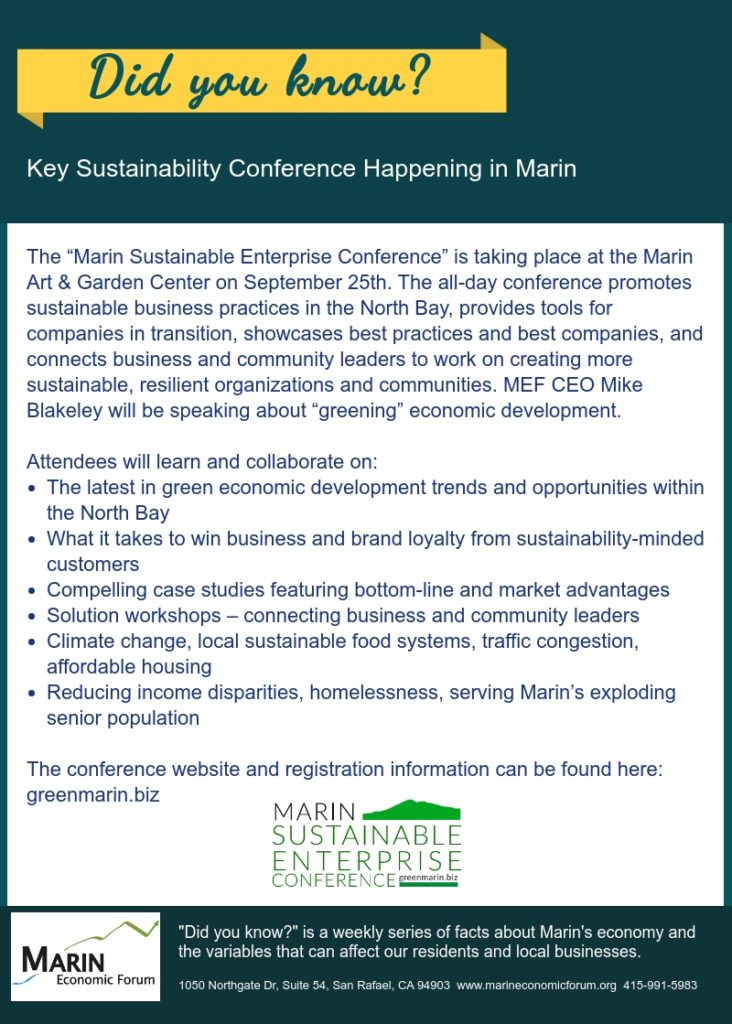

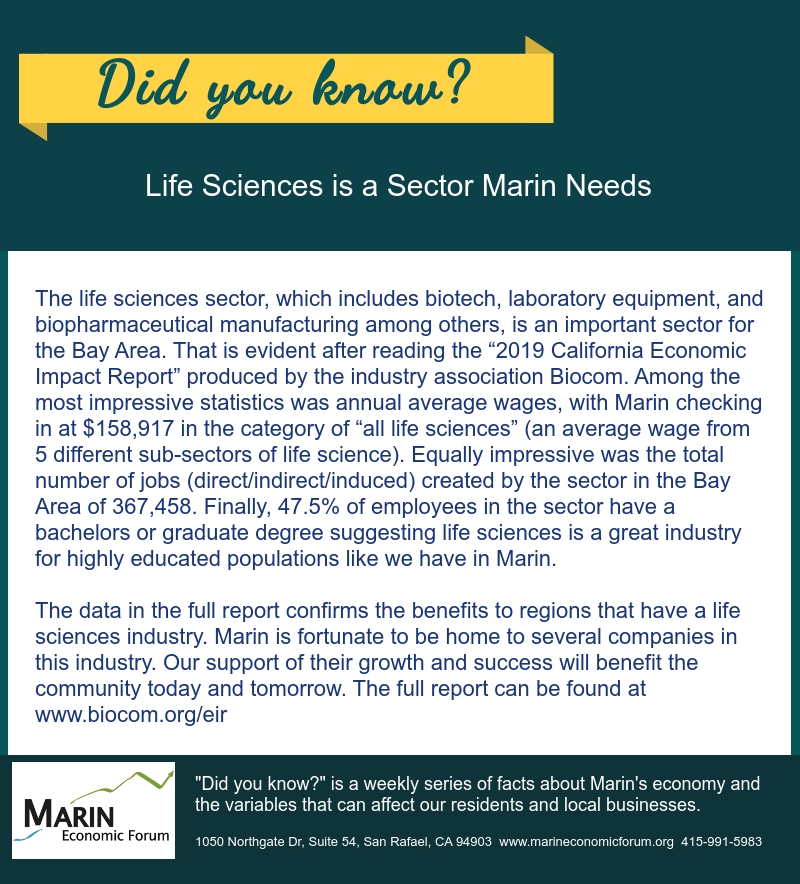

September 3, 2019
It’s no secret the Bay Area is the place to launch your dream business – entrepreneurs flock here like actors to Hollywood. According to crunchbase.com there are 489 publicly traded companies in the San Francisco Bay Area including Marin’s own Autodesk. But it’s not limited to the technology sector; healthcare and food are also big players in this region. So, what is it that breeds these types of successful businesses? It’s not the nice weather, free-spirited attitudes or even innovation, it’s something called an “entrepreneurial ecosystem” and strengthening the one we have in Marin can be a big benefit to our residents.
An entrepreneurial ecosystem describes a set of conditions, some existing, some created, to bring people together and foster economic prosperity and wealth creation. The graphic below identifies the standard elements of any entrepreneurial ecosystem.

Although the figure is composed of 9 elements, I would argue 4 of them are most significant: funding & finance, support systems/mentors, culture, and human capital & workforce. The strong presence of these four elements have ensured the Bay Area is a leading destination for entrepreneurs. In other regions, elements like “government policy” may have stronger influence on success.
San Francisco and Silicon Valley are responsible for a staggering 40% of all U.S. venture capital funding according to the 2018 PricewaterhouseCoopers/CB Insights MoneyTree report. If you need money to start your company, you come here. As far as human capital, the early technology companies with links to Stanford created a pool of technically skilled entrepreneurs that went on to create their own companies. Fast forward to today and you not only have a fully developed pipeline of high-skilled workers but a culture of entrepreneurship that is part of the Bay Area DNA. Finally, the support systems are excellent; regional incubators and accelerators have world class services that can carry entrepreneurs’ dreams to reality and many successful entrepreneurs have joined the investor and mentoring ranks.
So, how does Marin’s entrepreneurial ecosystem look? Applying a filter of ecosystem elements discussed above, here are some of our findings:
Marin doesn’t have recognized angel investor networks like other counties in the region do (funding piece) but we do have successful investors among our residents as well as entrepreneurs that understand the necessity of start-up capital;
We have a workforce of high-skilled residents that work in sectors like media, technology and healthcare who may desire to start or have started companies. Coincidentally these sectors rank in the top-5 for receiving venture capital;
We have coworking spaces like WeWork, VenturePad and The Hivery, but would benefit from a stronger presence of incubators and mentoring networks;
We have two higher-ed institutions (Dominican University and the College of Marin) that could serve as a talent pipeline with strategic partnerships to the business community;
We have elected officials that understand the importance of economic vitality and the need for good jobs for Marin residents; and
We do have a start-up culture in Marin, including known stars like Glassdoor and BioMarin but with fast growing companies like Waggle, Inc., AdvisoryCloud and Sorry Robots LLC. These firms were founded in Marin but are now serving global markets.
These factors confirm the foundations of an entrepreneurial ecosystem already exist in Marin but relative to other regions it could be considered “underappreciated.” Building up the ecosystem could help residents launch companies, strengthen future workforce pipelines for middle and high skill jobs and attract innovative companies with good jobs. How we build it and define what we want it to look like is a conversation we need to start.
Mike Blakeley, CEO
Marin Economic Forum
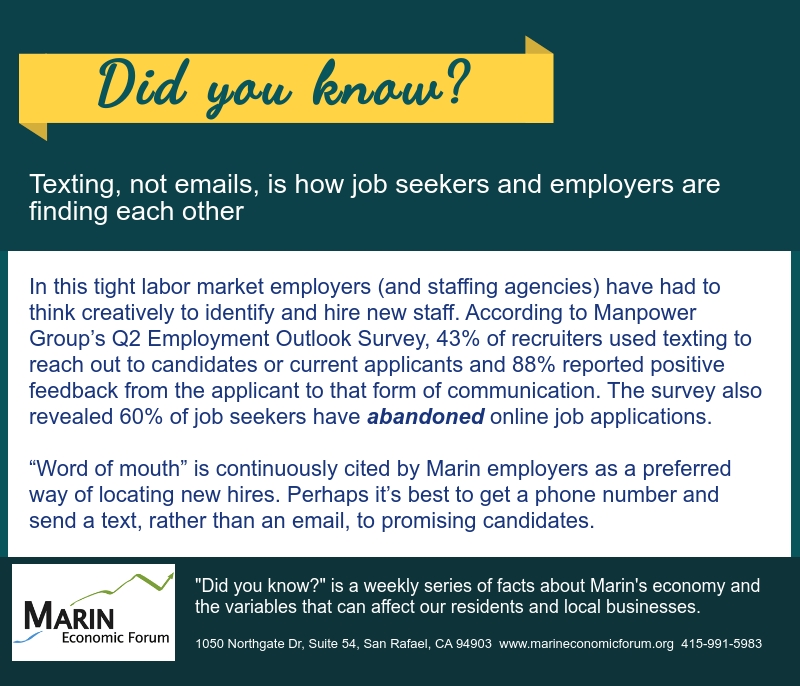
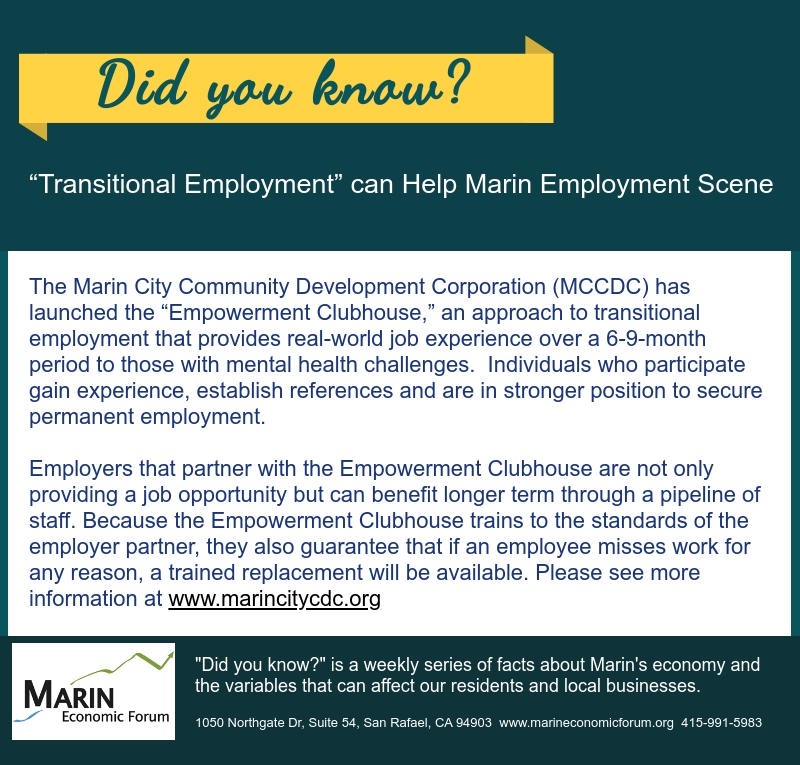
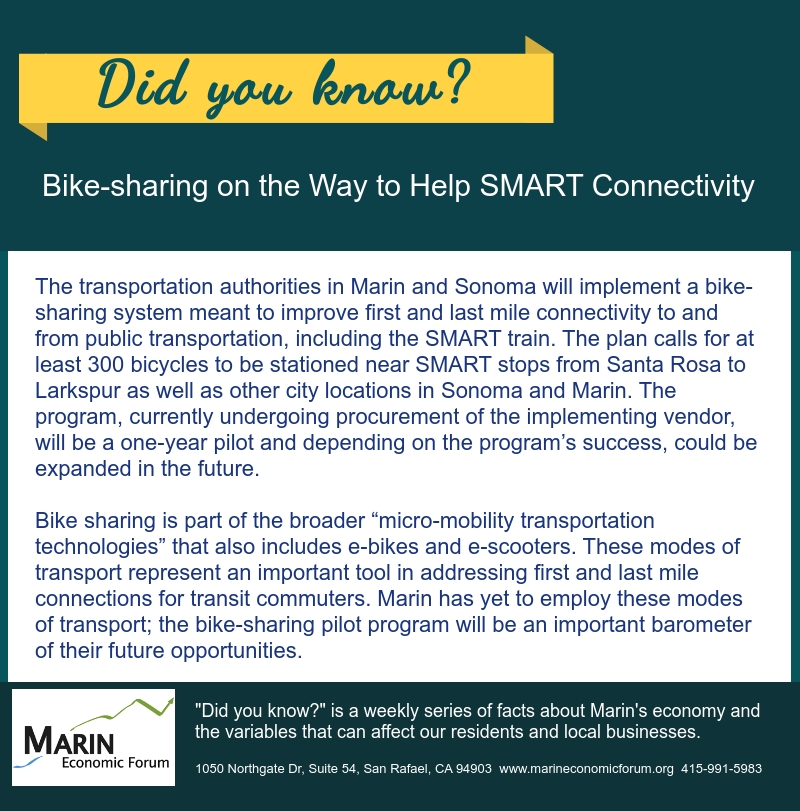
July 31, 2019
Last month one of my favorite local bike shops closed its doors. I had noticed changes in the store over its lifetime, from selling bikes to focusing on more profitable merchandise and repairs, but even that wasn’t enough to save the business. Marin residents are watching this story repeat itself with some other beloved merchants. On the flipside, some successful companies like Glassdoor and Straus Creamery, are moving out of Marin because their expansion demands, like talent or space, cannot be satisfied by remaining here. All of this is troubling for a lot of good reasons:
Research shows that over 80% of any U.S. region’s economic growth comes from local businesses – not by attracting new ones. Yet if our local businesses grow – and then leave – there needs to be something to replace them to continue the pipeline of jobs, tax revenues and corporate philanthropy that Marinites depend on;
To that extent, the current environment for starting a business in Marin is not great. Marin has just a few “incubator” spaces where entrepreneurs can access assistance they need to grow their companies and as technology sector experts have noted, we lack the critical mass of venture capital funding that would allow successful start-ups to scale;
The recent “National Citizens Survey” commissioned by the Marin County Board of Supervisors revealed that 98% of Marin resident respondents (over 3,000) purchase goods or services from a business located in Marin County. If those goods and services are not offered because we don’t have those businesses, then residents suffer; and
A significant proportion of our residents leave Marin each day to work in places where there is a higher volume of high-skill jobs (with high salaries); the resulting commute traffic is not only stressing our infrastructure but stressing those individuals who do it every day.
These issues, and the many others I did not share for the sake of brevity, are things that can be addressed and will be addressed through the “Marin County Business Retention & Expansion” project implemented by MEF and community partners. In listening to over 50 businesses (and another 100+ are lined up for focus groups and interviews), we are finding that businesses have solutions but not the time, energy or critical mass of colleagues to take on these issues. For example:
Retailers know they need more foot traffic but that will only occur if cities and towns are on board promoting more visitors (read by some as “traffic”) and have good marketing strategies. Retailers also feel the squeeze of the “Amazon effect” but don’t know best practices to compete.
Marin has never had a strong business attraction spirit but the current resident landscape (more working professionals and higher education attainment relative to the past) as well as the desire of companies to provide quality of life for their employees has resulted in more companies considering Marin as a location. How are we ensuring those kinds of companies can learn about locating in Marin?
These are just two examples of the interest and desires of local businesses that are being communicated through the project. Residents (and policymakers) should be excited that MEF, along with 17 community partners like Chambers of Commerce and other business groups, will use this input to drive evidence-based solutions and programs that can lead to a more vibrant local business community. Those solutions will allow our local businesses to survive and thrive-today and tomorrow.
Mike Blakeley, CEO
Marin Economic Forum
As companies continue to squeeze into the already crowded confines of San Francisco and Silicon Valley, some turn further north instead, attracted by a different lifestyle, cheaper rents and breezier commutes.
One of those companies is Gemini Data, which moved from San Francisco’s Presidio to the Drake’s Landing office complex in Greenbrae last summer. CEO and founder Tony Ayaz singled out the availability of commercial real estate and better pricing compared with San Francisco as a major factor in the decision to move north.
